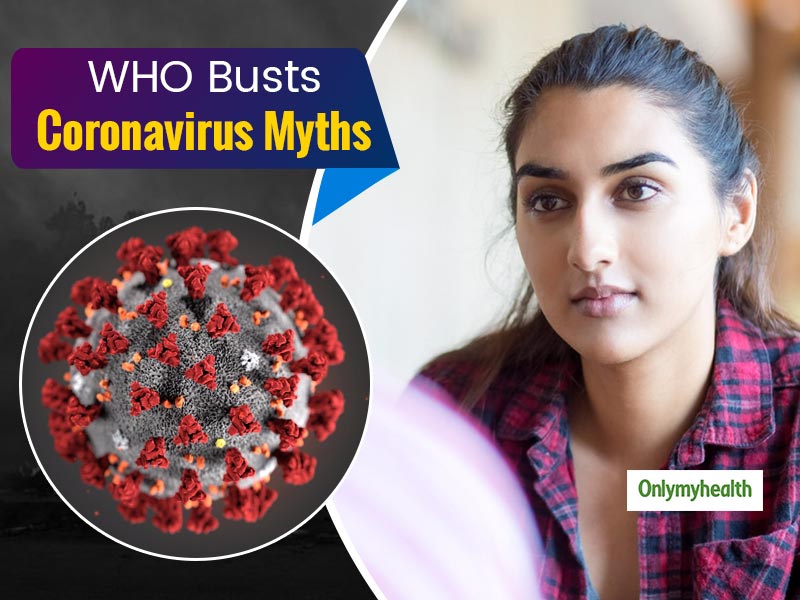
The World Health Organization had declared the coronavirus outbreak of global health energy. With the outbreak of coronavirus, there have been myths about ways to prevent and cure the virus. Here’s what the World Health Organization has to say and explain about the various misconceptions about coronavirus:
Table of Content:-
Hand dryers aren’t effective in killing the new coronavirus

There had reportedly been rumours about using hot air for 30 seconds from a hand dryer can remove the virus from your hands. WHO advises to protect yourself from the deadly coronavirus, by cleaning your hands with alcohol-based hand rub or washing them with soap and water. It is advisable to dry them thoroughly by using paper towels or a warm air dryer. Also, according to WHO, UV lamps should not be used to sterilise hands or any other areas of skin as this can cause skin irritation
Thermal scanners do not detect coronavirus

The WHO talked about how it is useful in identifying people who have developed a fever (i.e. having a higher than average body temperature) because of infection with the new coronavirus but they cannot detect people who are infected yet not sick with a fever. As it can take two to 10 days for people to become ill and develop a fever.
Also read: Coronavirus: Remembering Dr Dwarkanath Kotnis Amid The Coronavirus Outbreak In China
Spraying alcohol all over your body does not kill the coronavirus
The viruses have already entered the body and cannot kill the substances so spraying alcohol on your body is rather harmful to clothes or mucous membranes (i.e. eyes, mouth). WHO advises using alcohol as per recommendations of doctors for medical use.
Packages and letters delivered from china are safe
WHO stressed on the fact that there is no risk of contamination by the novel coronavirus when receiving a package from china. The contamination of coronavirus does not survive long on objects, including letters and packages reported by the global health authority based on their analysis.
Pets at home do not spread coronavirus

Certain people said that pets could be the leading cause of the outbreak since the spread of this virus has got through the snakes and mammals, according to various researches. The global health organisation says there is no evidence or scientific proof that animals/pets at home, such as dogs or cats can spread or be infected with the 2019-nCoV. WHO, however, advises washing hands with soap and water after touching or engaging with the pets at home as this will protect you against various common bacteria such as E.coli and Salmonella that can pass between pets and humans.
Vaccines against pneumonia don’t protect you
WHO reminded that vaccines against pneumonia could not save people from not such as pneumococcal vaccine and Haemophilus influenza type B (Hib) vaccine as the researchers are trying to develop a vaccine against 2019-nCov which is supported by WHO too. However, WHO recommends taking vaccines that would protect them against the respiratory illness for health safety and the public should consult the doctors about the vaccine.
Also Read: Coronavirus: Save Yourself From The Myths Surrounding The N95 Masks For Coronavirus Prevention
Rinsing the nose with saline cannot stop coronavirus

In a statement by WHO, “Saline cannot definitely protect from new coronavirus infection. Though some evidence says that regularly rinsing the nose with saline can help recovery in common cold but not in respiratory infection.
Mouthwash cannot protect you from infection
Gargling mouthwash doesn’t have any evidence that it protects you from coronavirus. To an extent, they can eliminate certain microbes for a few minutes in the saliva, but that doesn’t mean they can protect you from 2019-nCov. The chemical disinfectants can kill the coronavirus on surfaces like bleach/chlorine-based disinfectants, 75% ethanol, peracetic acid, and chloroform. Still, they have little or no impact if you put them on the skin or under your nose. “It can be dangerous to put these chemicals on your skin”, as per WHO.
Read more articles on Other Diseases
How we keep this article up to date:
We work with experts and keep a close eye on the latest in health and wellness. Whenever there is a new research or helpful information, we update our articles with accurate and useful advice.
Current Version
